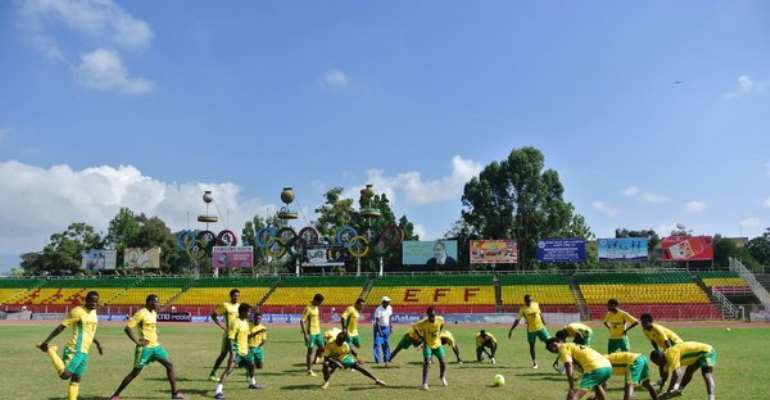Ethiopia train on uneven, wet field for Nigeria

Less than a week before the most important match in its history, Ethiopia's national soccer team trained on a wet, uneven field on the outskirts of the capital. Nearby, a woman hung her wash on a clothesline. Birds of prey circled overhead, and sometimes a plane flew past at low altitude, coming from the capital's busy airport, which a few months ago added a connection to Rio de Janeiro.
The timing could not have been better. Ethiopia will face Nigeria on Sunday in the first leg of one of five home-and-home playoffs that will determine the five African teams in next summer's World Cup in Brazil. A few years after it was barred from even attempting to qualify for the 2010 World Cup, Ethiopia is two games from reaching the tournament for the first time.
'We have played against Nigeria many times,' Ethiopia's coach, Sewnet Bishaw, said at a luxury hotel in the city center, where the team has been living as it prepares for the match. 'Even though Nigeria is a big nation, a big country with huge, skillful and professional players, we've become very strong in the past few years.'
The African playoffs include many of the World Cup regulars - Ghana, Ivory Coast, Cameroon - that have for years fed talent to Europe's top clubs and leagues. The presence among them of Ethiopia, a persistent underdog that won its only African championship a half-century ago, is among the biggest surprises of the current qualifying cycle. But a string of good results, a rare bit of stability in its national federation and a focus on youth development have many in Ethiopia, Africa's second-most populous country, feeling as if a sleeping giant has been awakened.
Nigeria, the reigning continental champion, boasts stars like Liverpool's Victor Moses and Chelsea's John Obi Mikel. Ethiopia fields a roster made up almost entirely of players based domestically.
And as the team's simple practice field attests, Ethiopian soccer still has far to go. In 2008, a power struggle inside the national federation led to its suspension by FIFA. As a consequence, Ethiopia was barred from qualifications for the last World Cup. This year, the fielding of an ineligible player in a World Cup qualifier against Botswana almost cost Ethiopia its chance at playing in Brazil.
The incident was partly caused by a federation official, Berhanu Kebede, who acknowledged he had failed to forward a communiqué by FIFA that had confirmed the player was ineligible, one of a series of similar problems in African qualifying this year.
Meshesha Wolde Denbel, a veteran local reporter, said the federation's instability partly explained the team's lack of success before this year. 'The current federation has done a lot of positive things,' he said, 'but I don't think the basic issues have been addressed.'
Many officials are unprofessional, he said. More coaches need to be trained. Another issue is the lack of work at the grass-roots level. With about 40 percent of Ethiopia's 80 million people under age 15, the country has a huge, largely untapped resource for creating the next generation of players and supporters.
'This is the time when players have hope,' said Kebede, the vice president of the Ethiopian Football Federation. 'It used to be everybody wanted to run away.'
Many in Ethiopia still remember the team's only title in the Africa Cup of Nations, in 1962. A military coup in 1974 was followed by years of terror, famine and poverty. National team players tried to escape whenever they had a chance, and as recently as 1998 the country did not even try to qualify for the World Cup.
Still very poor, Ethiopia has one of the world's fastest-growing economies, and soccer has been a beneficiary. Among the many construction projects across the country are six new stadiums.
Whereas national players used to earn a few hundred Ethiopian birr - 19 birr are currently worth $1 - the Ethiopian soccer federation offered each player $111,000 for winning this year's Africa Cup of Nations and $55,000 for reaching the final. (Money cannot paper over everything; Ethiopia failed to advance out of the first round, with one of its losses against Nigeria.)
